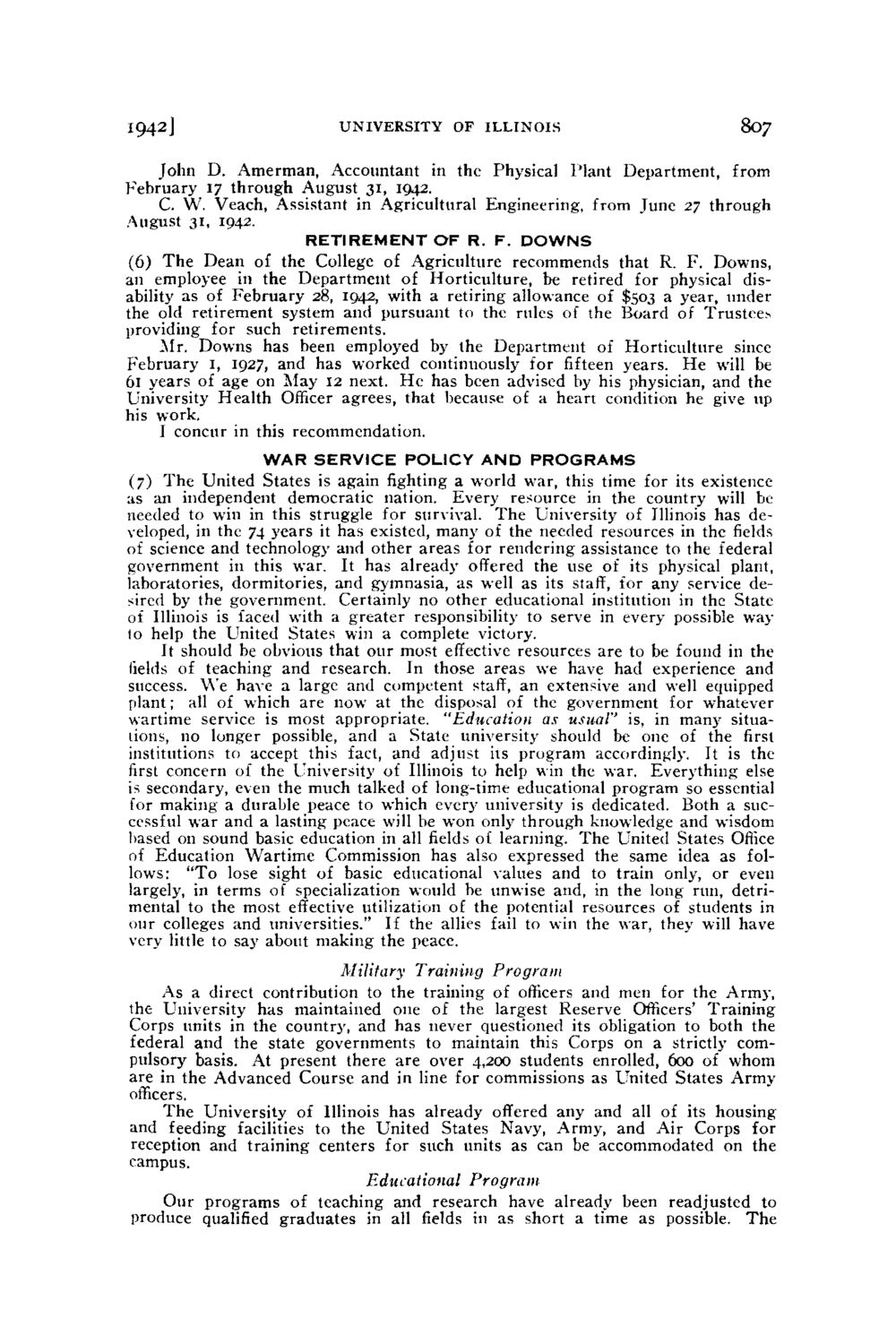| |
| |
Caption: Board of Trustees Minutes - 1942
This is a reduced-resolution page image for fast online browsing.

EXTRACTED TEXT FROM PAGE:
1942] UNIVERSITY OF ILLINOIS 807 John D. Amerman, Accountant in the Physical Plant Department, from February 17 through August 31, 1942. C. W. Veach, Assistant in Agricultural Engineering, from June 27 through August 31, 1942. RETIREMENT OF R. F. DOWNS (6) T h e Dean of the College of Agriculture recommends that R. F . Downs, an employee in the Department of Horticulture, be retired for physical disability as of February 28, 1942, with a retiring allowance of $503 a year, under the old retirement system and pursuant to the rules of the Board of Trustee* providing for such retirements. Mr. Downs has been employed by the Department of Horticulture since February 1, 1927, and has worked continuously for fifteen years. H e will be 61 years of age on May 12 next. H e has been advised by his physician, and the University Health Officer agrees, that because of a heart condition he give up his work. I concur in this recommendation. WAR SERVICE POLICY AND PROGRAMS (7) T h e United States is again fighting a world war, this time for its existence as an independent democratic nation. Every resource in the country will be needed to win in this struggle for survival. The University of Illinois has developed, in the 74 years it has existed, many of the needed resources in the fields of science and technology and other areas for rendering assistance to the federal government in this war. It has already offered the use of its physical plant, laboratories, dormitories, and gymnasia, as well as its staff, for any service desired by the government. Certainly no other educational institution in the State of Illinois is laced with a greater responsibility to serve in every possible way lo help the United States win a complete victory. It should be obvious that our most effective resources are to be found in the fields of teaching and research. In those areas we have had experience and success. W e have a large and competent staff, an extensive and well equipped plant; all of which are now at the disposal of the government for whatever wartime service is most appropriate. "Education as usual" is, in many situations, no longer possible, and a State university should be one of the first institutions to accept this fact, and adjust its program accordingly. It is the first concern of the University of Illinois to help win the war. Everything else is secondary, even the much talked of long-time educational program so essential for making a durable peace to which every university is dedicated. Both a successful war and a lasting peace will be won only through knowledge and wisdom based on sound basic education in all fields of learning. The United States Office of Education Wartime Commission has also expressed the same idea as follows: " T o lose sight of basic educational values and to train only, or even largely, in terms of specialization would be unwise and, in the long run, detrimental to the most effective utilization of the potential resources of students in our colleges and universities." If the allies fail to win the war, they will have very little to say about making the peace. Military Training Program As a direct contribution to the training of officers and men for the Arm}', the University has maintained one of the largest Reserve Officers' Training Corps units in the country, and has never questioned its obligation to both the federal and the state governments to maintain this Corps on a strictly compulsory basis. At present there are over 4,200 students enrolled, 600 of whom are in the Advanced Course and in line for commissions as United States Army officers. The University of Illinois has already offered any and all of its housing and feeding facilities to the United States Navy, Army, and Air Corps for reception and training centers for such units as can be accommodated on the campus. Educational Program Our programs of teaching and research have already been readjusted to produce qualified graduates in all fields in as short a time as possible. T h e
| |